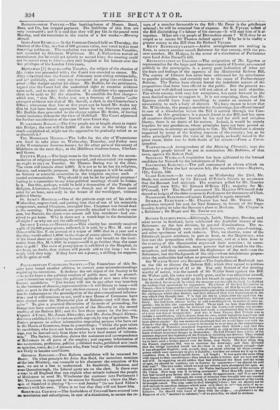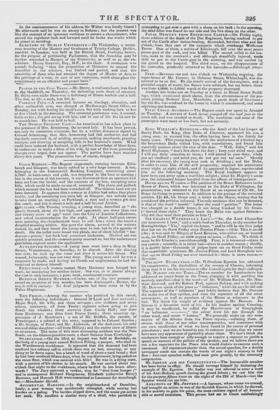REFORM ILLusuNATioNs—Edinburgh, Leith, Glasgow, Dundee, and other towns in Scotland,
have celebrated the doubtful victory of the Reformers on the late division, by general illuminations. The re- joicings at Edinburgh were mingled, however, with nane-breaking, and other specimens of mob violence. This,. we observe, sonic of the Edinburgh papers attribute, in part at least, to the Magistracy, who first met the proposition with discouragement, and at a late hour in the evening of the illumination expressed their sanction : in conse- quence of which vacillation, many persons had nit joined in the illu- minations, and thus encountered the displeasure of the mob—not the Reformers, but the blackguards of the city—whose mischievous propen- sities the authorities had taken no precautions to control.
SIR WALTER SCOTT AND REFORM.—The freeholders of Roxburgh met on the 23d to discuss the Reform Bill ; which they agreed to petition against, by a majority of 47 to 23. The only feature of the meeting worthy of notice, was the speech of Sir Walter Scott against the Bill. Sir Walter said, his voice was nearly gone, and he was otherwise unwell, but he would willingly yield up his last breath in opposing the measure. He disliked the moment in which the measure was brought forward, he disliked the feelings that spurred on its supporters. They knew of the la4t I:evolution in France,—how it happened he would not stop to inquire ; all that he would say was, that the persons who climbed to the democratic part of the constitution, had obtained the advantage which they desired, and they obtained their own Government in the way which they thought. best. T' is had set fire to a train over the land that has burned far and wide. France for ages had been Imitating our constitution, but not fairly. She had been always trying to add something to it, to render it more ex- quisite; but in this she constantly failed. There were no less than thirteen dif- ferent constitutions, and this he believed was the fourteenth within our recollec- tion, and in every one of them France had made a constitution that in the course of a year was found inapplicable. And was it from France that Britain was to imitate a constitution, and to depart from its own, which had given happiness and victory to the country, and had carriedits glory to a height to which France had never been able to attain ? He was moreover convinced that we would have war with the French—that they would never cease to be hostile to us as long as the remembrance of the battle of 'Waterloo remained impressed upon their minds ; and that this country could not be considered in a state of safety as ,ong as they could du us any harm without imminent danger to themselves. He had himself seen a little of the extreme degree of the ingenuity of the French in imitating our devices. They Wished to introduce from this country an iron bridge. They sent to an engineer of this coun- try to have such a bridge placed over the Seine, near Manly. The first thing that the French engineers did, was to examine the drawings; and they declared that the bridge intended would not do—that it was not elegant enough—that It was altogether English; and, as such, they set about altering all those counter- poises which were necessary to give it stability ; but they no sooner set it up in this condition than it turned upside down. (A laugh ) It was quite the same thing with regard to their constitution—they tried to make it better, and we now smithe end of it. In repairing an old edifice that had withstood the Rood and the winds of ages, we should be cautious not to destroy its symmetry—" we should let well bide well." The tree under which we and our fathers have slumbered for ages, we should not be rash in cutting down. Sir Walter had heard much of the success of the Union. How long was it in being successful ? More than fifty years—men's hair had turned gray before this success made its appearance; and they now had their hopes realized. Although the worst of miseries were brought into our country by an innovation so much lobe deprecated, it would, in the government of the world, be brought round. The crop came in God Almighty's time ; but we should not be rash enough to sanction changes which were very likely to oc,--ion evils of no or- dinary kind, instead of continuing to live quietly and pea. as we have done hitherto. He should take leave of them with the adage gladiators to the Emperor of old," morituri te salutant,"-s-if we pass this, we shall be undone.
In the commencement of his address Sir Walter was loudly hissed I He afterwards said he was no enemy to Reform ; but the present was like the attempt of an ignorant workman to correct a chronometer, who moved the regulator back and forward until he broke the works which le aimed at mending.
ELECTORS OF Dunsix UsavEnsiTy.—On Wednesday, a nume- rous meeting of the Masters and Graduates of Trinity College, Dublin, resident in London, was held at the British Hotel, Cockspur Street, .for the purpose of petitioning Parliament,-that the franchise may be further extended to Masters of the University, as well as to the ex- .scholars. Henry Maxwell, Esq., M.P., in the chair. A resolution was passed, declaring "that the proposition of Ministers to extend the franchise to the scholars, was limited and partial, and that the admission of those who had attained the degree of Master of Arts to the privilege of a vote, in case of any extension, could alone place the constitueecy on an efficient and proper basis."



























 Previous page
Previous page